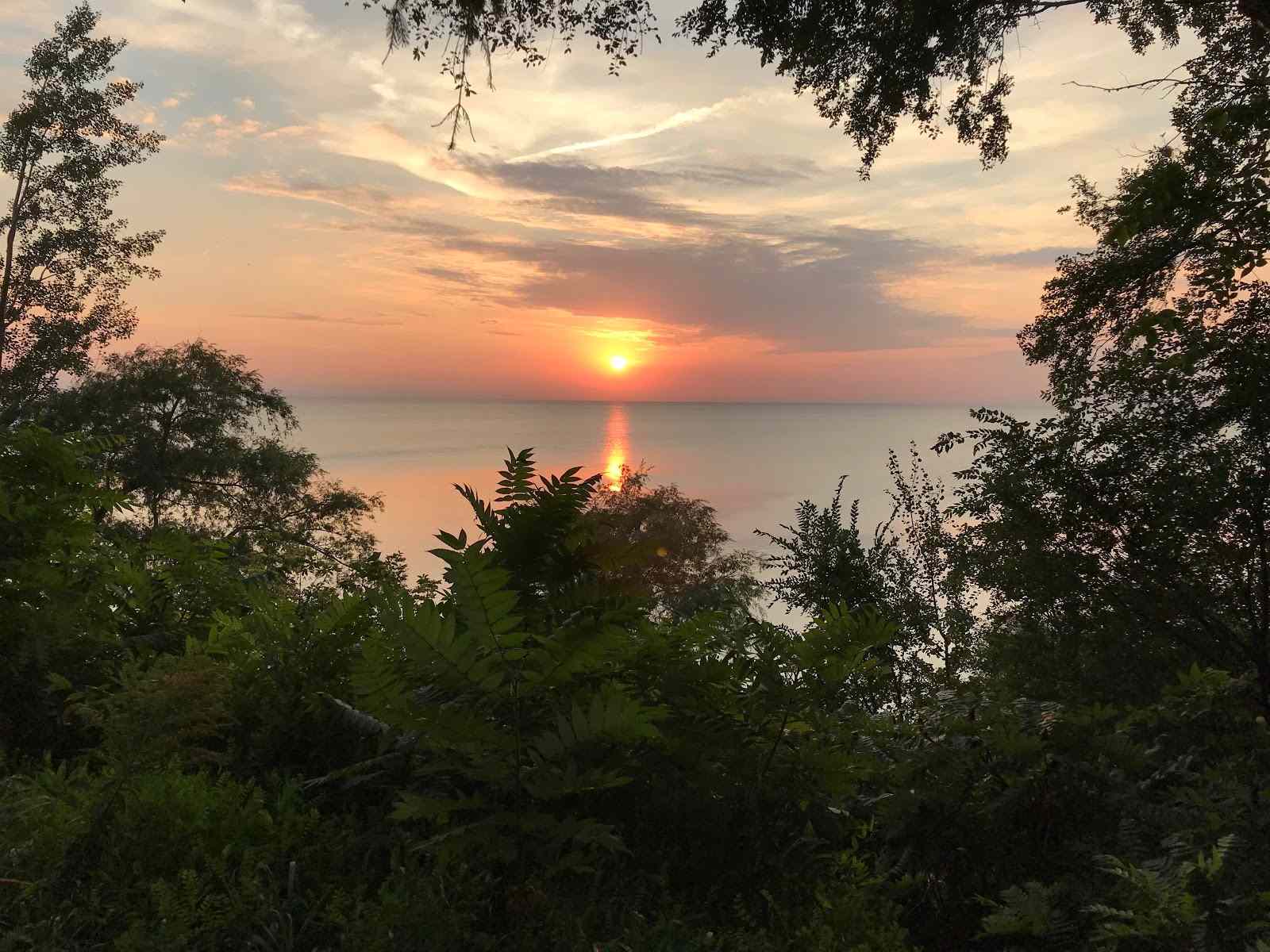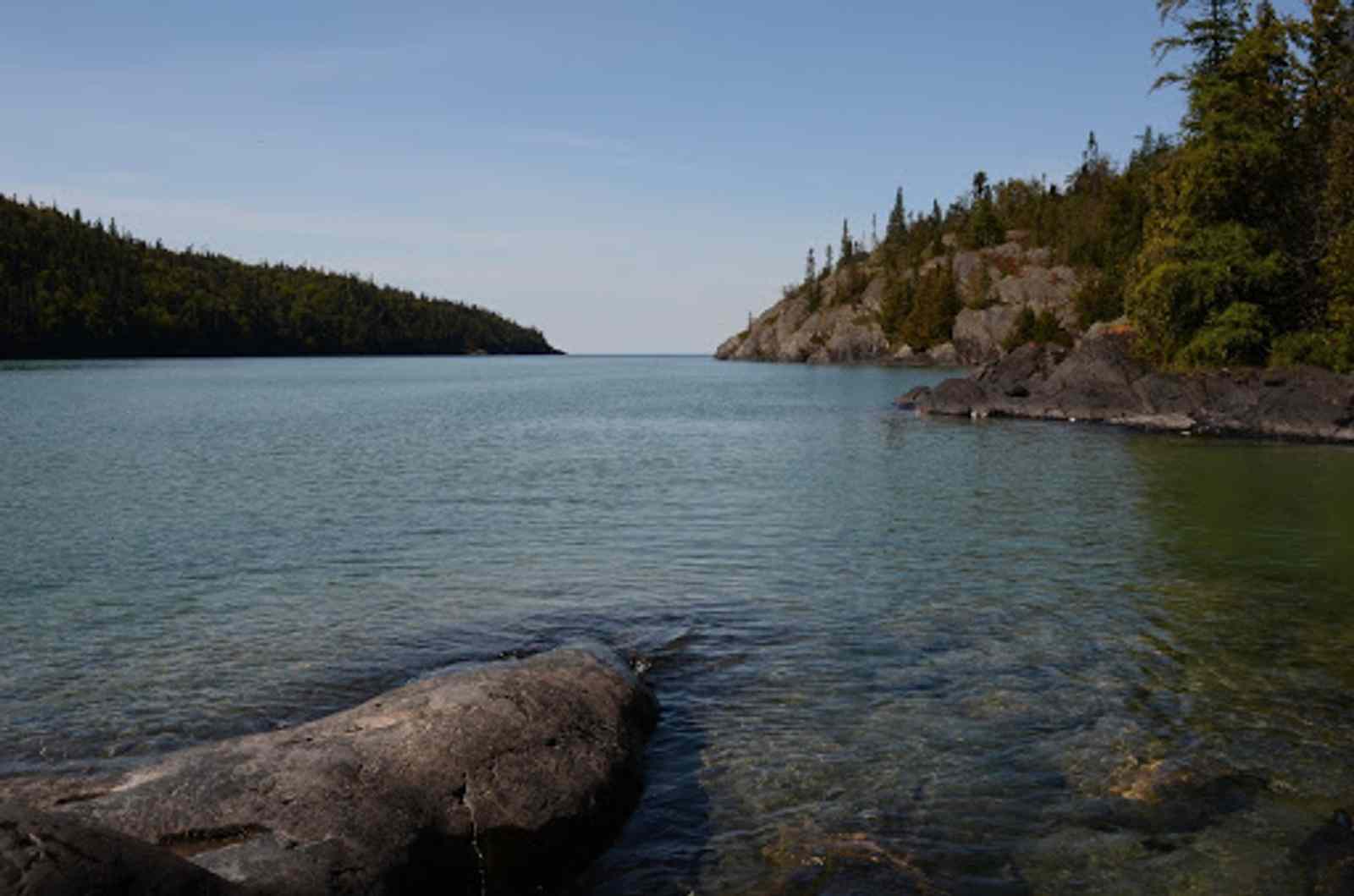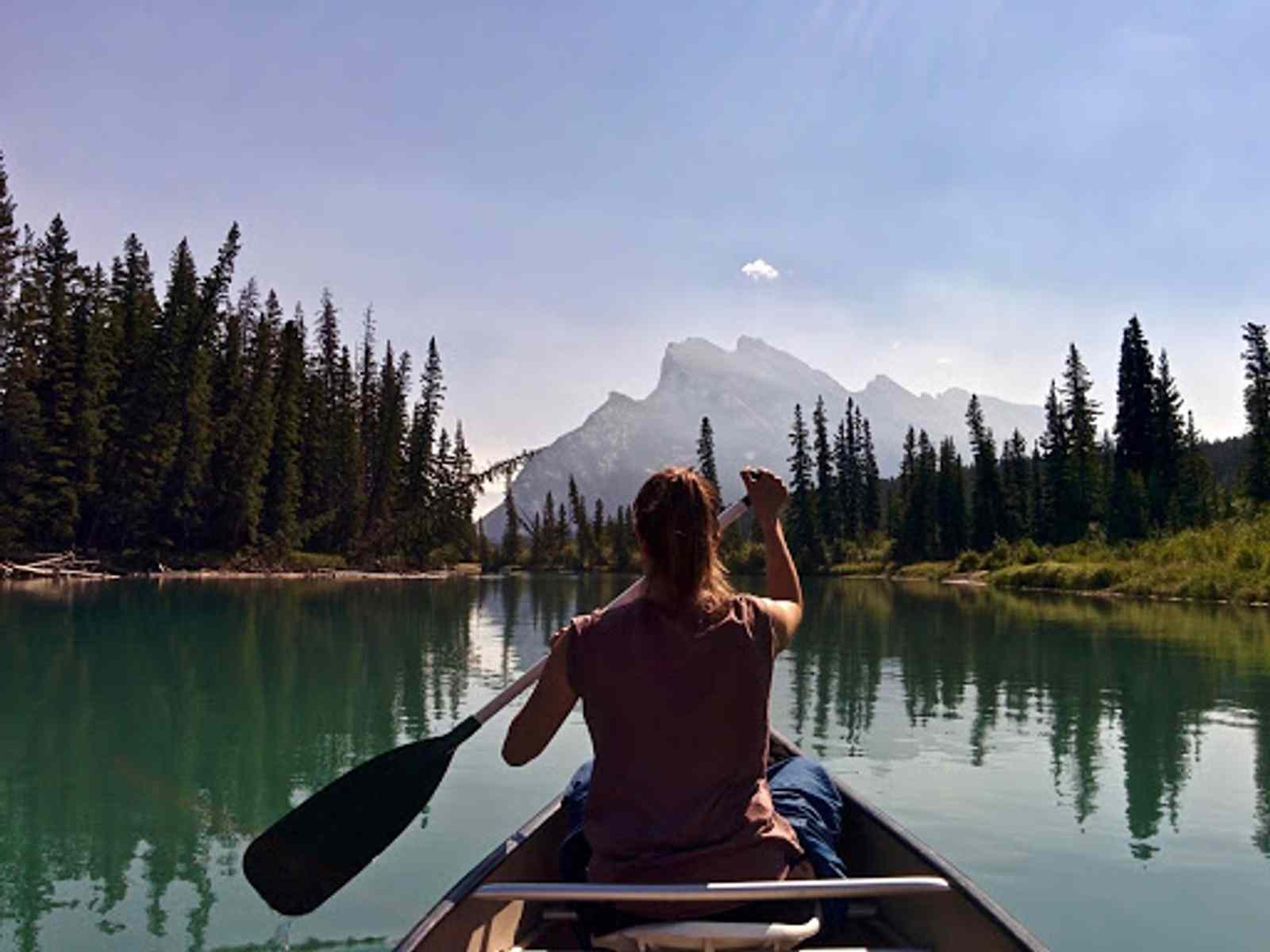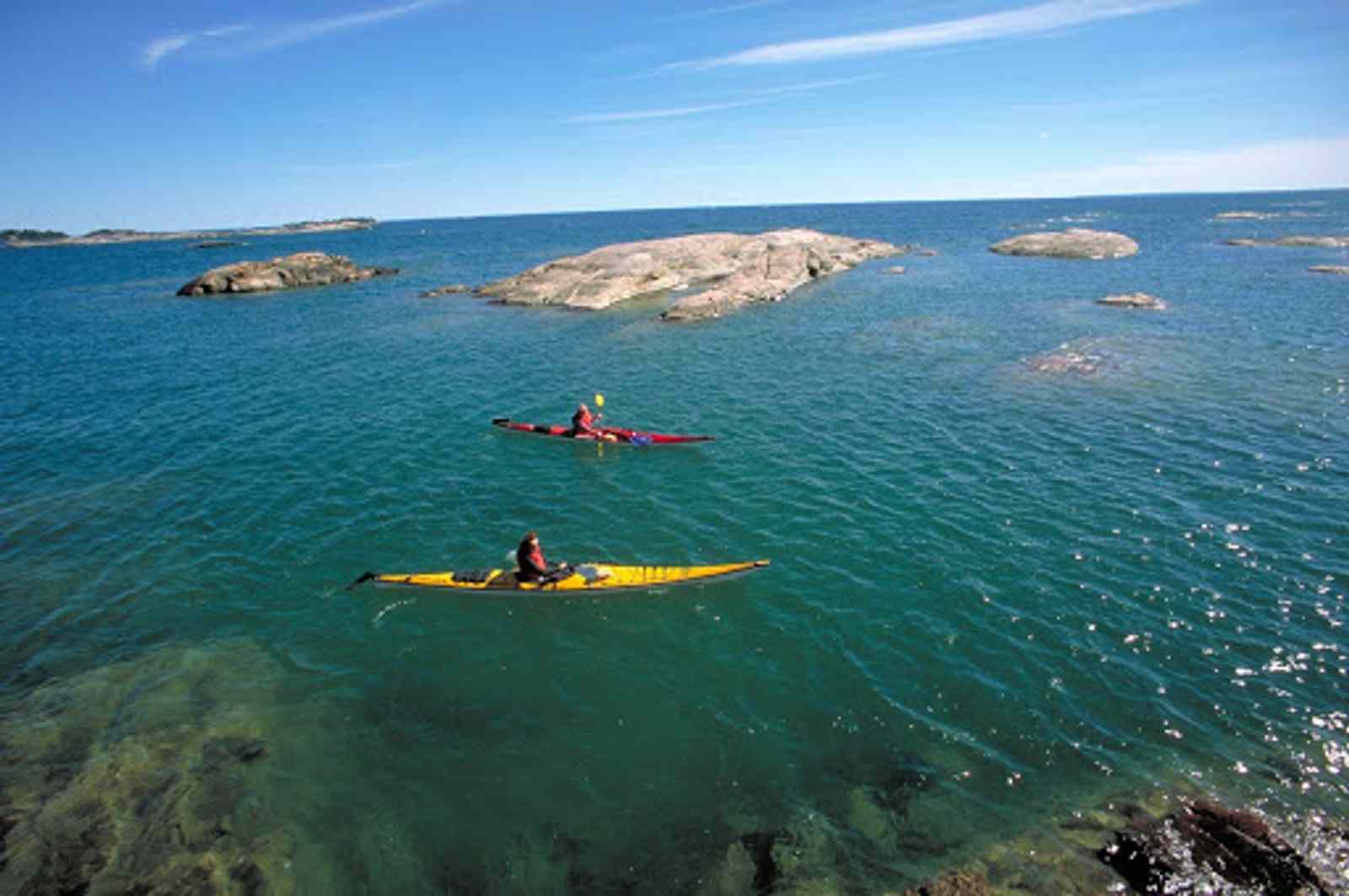Published May 22, 2019
Maggie Hall is completing her Masters degree at the University of Waterloo. She is a collaborator with Girls Gone Water and the creator of the Humans of Water project. Together they explore and encourage human connections to water. This is her Watermark.
What is your waterbody?
Lake Huron is the site of my family's cottage. It's been in my family for almost 90 years. I think it’s my earliest memory and the place I’m most at peace. It's located on top of a cliff, we call it “the bank” but it's 60 feet tall with a lot of stairs going down to the beach. It's west-facing so it has gorgeous sunsets. The water in certain light almost looks like one could be in the Caribbean. It's just a perfect turquoise, it's magical. That’s my waterbody.
What is your connection to water and Lake Huron?
Lake Huron. It's beautiful and I’ve had unique experiences here that differ from those I’ve had at other Great Lakes. I feel like I've been placed in this longitudinal study with the lake. I have these memories from years and years ago, pictures of my cottage and the 40 or 50 feet of perfect sandy beach. I've been able to track the fluctuations and changes in the lake over time.
I studied geography and anthropology in my undergraduate degree, and now I study the complex interactions between water and humans in my Masters degree. I really enjoy learning about the integration of environment and humanity and I did a co-op placement where I learned about source water protection. I’ve found that my perspective of Lake Huron changes almost yearly, based on the new information that I’ve learned over time.
One of the first memories I have of the lake; my dad and I are swimming in the water. I vividly remember the moment. We’re playing and my dad looks off into the distance. He sees this line across the horizon. It's still blue skies and beautiful where we are but when you look further out there's a dark line across the sky. He said, “I think we're going to get out of the water.”
Just off the shoreline are these amazing sandbars. There are a few of them and we were on the second one, so it took us a while to swim back in. When we got to the stairs on the beach, I remember we had to climb up the 60-foot bank, which was a lot of stairs for my tiny 8-year old legs.
The colour of the water is so intimately connected with the sky and the clouds and how it reflects the sunlight. By the time we got up to the top and looked back, the water had turned from that beautiful turquoise blue to a murky, cloudy green. The clouds started coming in and literally as soon as we got into the cottage, the rain hit. The wind was incredible. That particular storm we actually had to hunker down in the cottage and secure all the furniture that was outside. It wasn't on the forecast; it just came out of nowhere.
That was my first exposure to how crazy weather can be on the water and how destructive water can be. My earliest memories are playfulness and childhood bliss and then, almost on a dime, how scary it can be when the weather turns. For me, that marks the beginning of my longitudinal study. My first opportunity over years and years to see how water changes. Now, that 40 to 50 feet of sandy beach is just not there anymore. The water level is so high that it's right up against the bank.

How has Lake Huron and water in general influenced your life?
I think water has always been a central element of my life. I don’t think I realized how important water was to me until the Walkerton water crisis.
My family is from Walkerton and we were there around the time when the E.coli outbreak happened in 2000. I was just a kid and luckily, didn’t get sick because of my insistence on drinking soft drinks, but several of my family members did. It was that experience - more so than my experience growing up on Lake Huron - that turned me in the direction of water protection. It led me to study the Clean Water Act which came into effect after the Walkerton crisis.
When you talk about Walkerton or you google Walkerton, you don't get: ‘Welcome to the town of Walkerton’, you see, ‘the Walkerton water crisis’. It’s ingrained in the town's fabric. But I think many people from Walkerton feel like they’ve acknowledged and learned from this horrible thing that happened and want to move past it to the second iteration of what this town is and can be.
The Walkerton Clean Water Centre is an example of this. It’s an incredible place for training water operators. They have this beautiful facility, expansive views of wonderfully kept farm land, kind people, but sadly, they'll always be known for being the site of one of the worst water-related tragedies this country has seen. Out of this tragedy, though, it acts as a very important example of the significance of source water protection beyond the traditional water treatment.
There were also little reminders of Lake Huron throughout my education. I remember connecting things that I was learning through my education with my experiences on the Lake. I heard from neighbours about a farmer nearby who was dumping animal waste into the gullies that ran into the lake. I was always told to avoid these gullies by my parents, but never understood why until later on. I also learned about the Indigenous peoples from that area and the next time I visited my cottage, I thought about the place very differently; what it must have looked like when First Peoples were there.
It's just kind of this thread that has been woven throughout my life, reaffirming what I was learning along the way by providing concrete examples and anecdotes.
I think it makes your education so much more visceral when you have time spent in the environment you're studying. I think there's a huge disconnect for people. We talk about protecting the environment but we're not spending any time in that same environment. How are you supposed to gain a true understanding of protecting the sanctity of something if you've never seen it, or experienced what it’s supposed to be like?

With this personal longitudinal study, I see the evolution of Lake Huron. How they control the water levels and how this very human process has affected the geography and the hydrology of the area. Human processes like farming and agriculture have led to impacts on water quality. You see how the tourism industry has grown in Grand Bend and how there's just so much more human activity. It was a case study in my life. All these things remind me of Lake Huron.
Why do you think this connection is important?
Craig Kielburger first started Free the Children because he read a newspaper article about a child’s awful experiences. The point of significance being that he read about it in the newspaper. That was enough to light a fire under him at 12 years old. He then proceeded to travel to India to see this struggle first-hand.
I used to be a travel agent and worked with an educational travel company. What I've noticed is that it is more important than ever for people to see things in-person in order to care. The sad reality is that travel is a luxury, and most kids won’t get the opportunity to go on these educational trips to witness first-hand what is going on in the world around them. The kids who do get to go come back saying “yes, I am starting to understand the problem, and I want to do something about it”. I always felt though that there was a missed opportunity here, for the students who didn’t get to go. What was being done for the average student to encourage their immersion in the world around them?
The problem now is that we tell students that in order to appreciate their environment, they need to travel. That it isn’t enough to just go outside. In my mind, I don’t think you need to travel to every corner of the world to build a connection to it. The importance of appreciating what is around you right now is experience-enough.
There is also the modern threat that people are spending more time on social media scrolling through thousands of pictures of water, but not necessarily building a true connection to the natural world. But if you actually visit a body of water and something happens to it, doesn’t that make you want to fix it because you've been there? What incentive do you have if you don't know what it's like? You've never been in it or around it or immersed in it, never made a physical connection that only comes with being near that waterbody.
In my case, being around Lake Huron encouraged a broader responsibility to all bodies of water, mostly because I had seen how wonderful but delicate our environment is. I wonder if that's how activism is going to evolve, that to really encourage people to participate they have to first experience it.

From my experience at the educational travel company, I heard about school boards eliminating water-based activities from their field trips. It seems to be stemming from safety and liability concerns, but I don’t think that they are not truly contemplating the long-term ramifications of this. This policy has effectively insulated an entire generation of young people.
In the era of climate change, we don't need people afraid of being outside or in the water. We need people who feel passionately about protecting something that is voiceless. There's a reason why stories and in situ participation are much more memorable than just hearing facts and figures. I don't think administrators are thinking about the next generation who are being kept inside and merely told about how important it is to save the environment, rather than to see and participate in it firsthand.
How has this led you to Girls Gone Water and Humans of Water?
I'm a student in the Collaborative Water Program at the University of Waterloo. It's part of the Water Institute. The program is interdisciplinary between all six faculties at Waterloo. The idea is to take students from each of these disciplines and put them in a room together to try and address “wicked” water problems. We learn how to work collaboratively with people who are from different academic backgrounds. It's about teaching teamwork and problem-solving, with water as a central theme and the common unifier.
I went to the Water Innovation Lab in Melbourne, Australia through an organization called Waterlution. Similar to what we did in the Collaborative Water Program, we had to come up with a prototype solution to a “wicked” water problem. A woman from Ecuador and I started talking about Humans of New York on Instagram and we thought, “what about humans of water”? Thus, Humans of Water was born.
A mutual connection thought that Humans of Water would be a great addition to the Girls Gone Water initiative. Dani, one of the cofounders, reached out and asked if I would be interested in being a collaborator and bringing Humans of Water over as a project.
Girls Gone Water currently has these wonderful “Women in Water” profiles of women who are doing really great things in the water space. These Women in Water, most of whom are professionals in the water sector, all echo the same sentiment: “preservation and conservation”; the science of it. Humans of Water comes in to supplement this great technical knowledge with what the average person thinks about water. We wanted to explore the average person's connection to water. Their stories are featured on the Girls Gone Water Instagram and Facebook pages.
With Humans of Water, I’m continuing to explore those personal connections. To talk to a normal human being about water. How does it inform what you do? Do you see it differently from something that you can just take from a tap? If you're going to encourage people to make that connection, you need to remind them how important water is and how much they interact with water every day. We need to remind them: take a moment and think about a time when water was significant to you.

Girls Gone Water launched in August 2018 and recently released their feature on the Bay of Fundy, check it out here. You can heck out the Humans of Water project on Girls Gone Water’s Instagram at @girlsgonewater and Facebook at Girls Gone Water.
